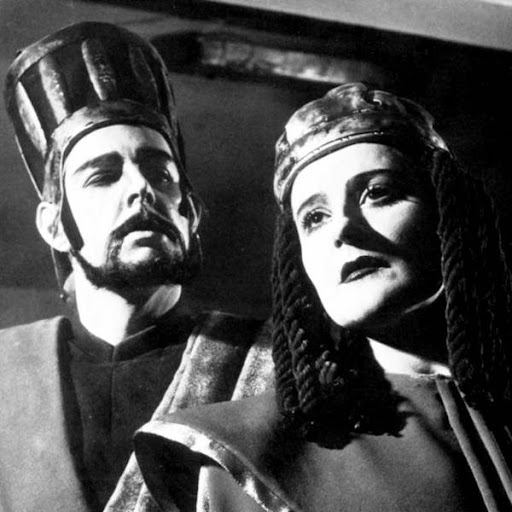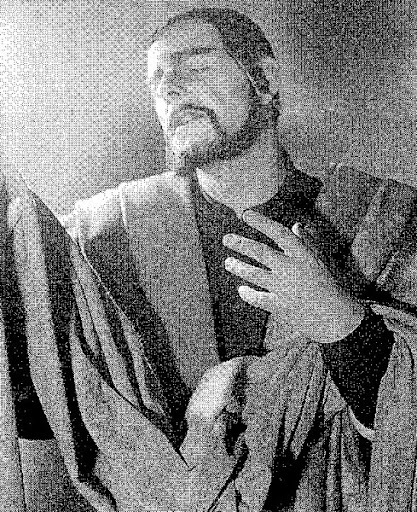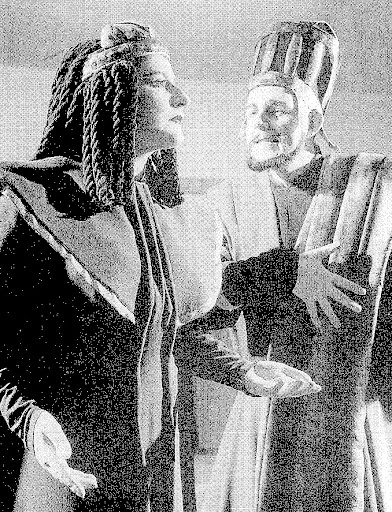
It seems that when most people think of German opera (if they think of German opera), they see the typical viking-horned fat lady singing. Carl Orff's Antigonae smashes that stereotype with cacophonous arrangements made all the more modern by the hard-edged sound of the German language.
The first Munich production of Antigonae in 1951 was declared "the renewal of opera," and this live recording, taken opening night, captures everything from Christel Goltz's career-making performance in the title role to the audience member who is unable to hold back a coughing fit. Scans of the complete libretto are included in German, French and English.

From Anette Unger (trans. Lionel Salter):
It was to be regarded as "festival and ritual theatre" and as a "topical musical interpretation, with present-day means" of Holderlin's version of Sophocles's drama. That was how Carl Orff then described his third large stage-work, Antigonae, written in the years 1947/48. In fact it's musical point of departure and apporach were wholly taken from the speech-rhythm of Holderlin's translation (only the choruses were completely set to be sung); and with the help of a foundation of 6 pianos, 4 harps, 9 double-basses, 6 each of flutes, oboes and trumpets as well as 60 (!) percussion instruments - some newly constructed - it was possible to come up with an entirely new, unusual orchestral sonority.
But the premiere of this tragedy, on 9 August 1949 in the Fesenreitschule in Salzburb by Oscar Fritz Schuh and Ferenc Fricsay, seems only to a limited extent to have conveyed the new impulse issuing from Orff. The whole was "designed as an intensification", wrote the Sudost-Kurier on 13 August, "without, however, being able essentially to prevent exhaustion by the listener". Nevertheless, when the work was given for the second time, half a year later on 27 January 1950 in the Semper Opera, Dresden, this time with Heinz Arnold producing and Joseph Keilberth conducting, opinion was different at a stroke. And the first Munich performance of Antigonae on 12 January 1951 - also staged by Arnold, and under the musical direction of Georg Solti - definitely left no further doubt: the Press proclaimed, through Orff's new tragedy, the "renewal of opera".

This success was also due to the team at the time , who - as Suddeutsche Zeitung declared again in July 1994 on the occasion of Heinz Arnold's death - succeeded in presenting nothing short of a "model staging". Everyone who experienced it recognised in particular, according to the SZ, "Arnold's gift for a compelling stylisation with a concentration on essentials". At that time Heinz Arnold had just become chief producer at the Bavarian State Opera (then the Prinzregenten Theatre) and had already, as opera director in Dresden, attracted international attention by his forward-looking productions. In Munich too he was to shape the character of the State Opera until 1967 - beginning with that famous realisation of Orff's Antigonae, whose decor by Helmut Jurgens (a section of a cone and an inclined surface) likewise created a tremendously modern effect in its archaism and simplicity.
Christel Goltz, hailed in 1950 by the SZ as "one of the most intelligent women of today's musical theatre", seemed made for the title-part. She had already left no doubt whatever of that in Dresden. For in 1950 - shortly before her engagement at the Vienna State Opera - the former member of the Semper Opera company had rehearsed with Arnold the role of the Theban king's daughter. That meant - as she herself once related in an interview - having to rehearse the part with her husband while on her sickbed as a diptheria patient in an isolation ward. "We always recited it rhythmically there. One had to be able to speak very well, to be quite clear in diction. For Antigonae is not any longer an opera in the usual sense." And she also proved this in Munich, though she convinced by the expressiveness of her declamation, and in addition was praised for the "complete unity of the religious, the Dionysiac and the musical". From then on, Christel Goltz sang the part on all stages ("Whenever it was then played, I always sang it"), and in the year of the first Munich performance received the American Oscar as the "best foreign female singer of the year".

As Creon she had beside her Hermann Uhde of the Vienna State Opera, who was shortly afterwards to join the Munich company. Uhde was likewise not new in the Antigonae team: he had already sung in the part of Creon at the Salzburg premiere. "Of the performers", the Sudost-Kurier said at the time, "in the first place must be named Hermann Uhde: as Creon he had to sing in Sprechgesant for almost three hours non-stop, and mastered all the difficulties of this singing while being totally convincing as an actor." And Benno Kusche, engaged in Munich since 1946, also drew on his experiences in the role of the Choragus which he likewise had gathered in Salzburg. Kusche had indeed already appeared many times as an Orff singer in general, and was also to take part in recordings of the stage works Die Kluge and Der Mond.
Besides Ernst Haefliger, who came from Zurich, a whole range of further soloists were from the Bavarian State Opera Company: the tenors Paul Kuen (A Guard) and Karl Ostertag (Haemon), both extremely popular in Munich. Irmgard Barth (Ismene) and Marianne Schech (Eurydice), as well as Kurt Bohme (A Messenger), who had been under contract to the house since 1949. In all, he took part in Munich in 29 premieres or first local productions. Karl Richter wrote of him, "The iron power of fate has scarcely ever been heard with more painful brutality, but also with greater implication for this world, than in the Messenger's account of the death of Antigonae and her beloved, Haemon". And no less than Orff himself dedicated to Bohme a photo of himself that he signed with the words, "To the messenger of all messengers". By this he fairly certainly may have meant, also, Bohme's roles of the "other messenger" in Oedipus der Tyrann and the "guardian of the dead" in Lamenti. Bohme was brought to the Bavarian State Opera in 1949 by Gerog Solti, who was among the most influential figures of its artistic development, and in 1951 conducted Antigonae as the last of his Munich first performances before leaving Munich a year later.

More than 20 years later he was to say to Karl Schumann about the reasons for his departure that he was "stumbling over the position of power of a composer-in-residence whose first performance of stage work in ancient Greek costumes he had conducted. As the author made ironic comments on his own score, on reminiscences of Stravinsky and suchlike, he had joined in, not suspecting that such jests were not appropriate to him" (Paul Robinson). Today it is known that there were many grounds why Solti, who in 1946 had been appointed musical director of the State Opera when just 34 years old, ended his time in Munich in 1952 and went to Frankfurt - along with Arnold. Whether there were in face disagreements with Orff may be immaterial. What was important, however, was the Solti made an outstanding artistic name for himself in these Munich years, which were crucial for him, and was involved in bringing out 25 enormously successful new productions. Years later, this period is still being judged the most important phase of the "most daring vertical take-off in the history of new interpretation" (SZ, 21 October 1987). But already in 1951, when his departure was becoming known, the Abendzeitung of 29 June read: "Munich knows what it is losing in Solti [...] In this year he has proved his versatility and his feeling for the dramatic nerve of a work by the performance of Orff's Antigonae." Of this legendary evening Carl Orff himself was of the opinion: "That this performance in Munich was possible is among the most gratifying happenings of my whole life".

Technical Information:
Composer: Carl Orff
Librettist: Carl Orff
Conductor: Georg Solti
Album: Antigonae- Disc 1
Date: January 12, 1951
Audio Codec(s): FLAC8
Encoding: Lossless
Rip: EAC split tracks
Avg. bitrate: 364 kb/s
Sample rate: 44100 Hz
Bits per sample: 16
Channels: 2
File size:
Disc 1- 205 MB
Disc 2- 187 MB
Length:
Disc 1- 1:19:01
Disc 2- 1:12:17
Cast:
Christel Goltz: Antigonae
Irmgard Barth: Ismene
Benno Kusche: Chorführer
Hermann Uhde: Kreon
Paul Kuen: Ein Wächter
Karl Ostertag: Hämon
Ernst Haefliger: Tiresias
Kurt Böhme: Ein Bote
Marianne Schech: Eurydice
The Bavarian State Opera Chorus and Orchestra
Herbert Erlenwein: choirmaster

Disc 1 Tracklisting:
01. Gemeinsamschwesterliches! O Ismenes Haupt! (9:11)
02. O Blik der Sonne, du Schönster (7:01)
03. Ihr Männer, wär's die Stadt allein (4:16)
04. Dir dünket diß, o Sohn Menökeus (6:51)
05. Mein König, dißmal plaudr' ich nicht (6:03)
06. Ungeheuer ist viel (5:15)
07. Wie Gottesversuchung aber stehet es vor mir (5:14)
08. Du also, die zur Erde neigt das Haupt (7:44)
09. Aber jetzt kommt aus dem Thor Ismene (5:58)
10. Glükseelige solcher Zeit (6:41)
11. Hämon kommt hier (14:49)
Disc 2 Tracklisting:
01. Geist der Liebe, dennoch Sieger (3:55)
02. Jezt aber komm' ich, eben selber (9:21)
03. Doch komm' ich an, so nähr' ich das mit Hofnungen (5:39)
04. O des Landes Thebes väterliche Stadt (5:07)
05. Ihr Fürsten Thebes! (18:35)
06. Der Mann, mein König, gieng viel prophezeiend (1:41)
07. Namenschöpfer, der du von den Wassern (2:53)
08. O ihr des Kadmos Nachbarn (3:44)
09. O all ihr Bürger! eine Rede merkt' ich (1:57)
10. Ich liebe Frau, sages (7:06)
11. Io! unsinnige Sinne (12:20)

Disc 1 Megaupload Link
Disc 2 Megaupload Link



